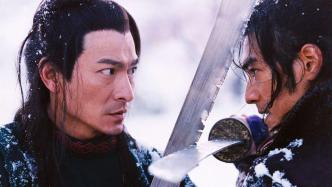
[Foreword] In 2002, a beautiful and magnificent "Hero" was born, which opened the era of blockbuster Chinese movies. Twenty years later, the box office of the first and second parts of "Changjin Lake" has accumulated nearly 10 billion.
Over the past 20 years, the annual box office of Chinese films has grown from less than 1 billion to over 60 billion. The number of screens has leapt to the top in the world, making it the second largest film market in the world.
In the topic of "20 Years of Chinese Blockbusters", we try to sort out the memories of the era of Chinese blockbusters, build the context of the rise of the Chinese film industry, look back at the turmoil and glory of Chinese films since the 21st century, and prepare for the next 20 years of Chinese films. Add a touch of prospect to your dream-making journey.
In the 1990s, inspired by Hong Kong movies, Zhang Heping, then general manager of Beijing Forbidden City Films, Han Sanping, director of Beijing Film Studio, Gao Jun and others, proposed the idea of creating a Lunar New Year file in the Mainland. In 1997, Feng Xiaogang's script "A Day Trip to Dream" (later renamed "Party A and Party B") based on Wang Shuo's novel was released as the first self-produced Lunar New Year movie in the Mainland, and won a box office of 30 million. Since then, "See You or Be There", "Endless" and "Big Wrist" have made Feng's comedy movies a national consumer entertainment activity at the end of each year, and the commercial attributes and vitality of movies have been activated like never before.
But it was Zhang Yimou's "Hero" in 2002 that really brought Chinese films into a new era and into the "big era". 20 years ago, "Hero" was born, with a gorgeous star lineup, magnificent visual spectacle, and a miracle box office of nearly 250 million... It can be said that it has opened up the imagination space of Chinese movies in all aspects.
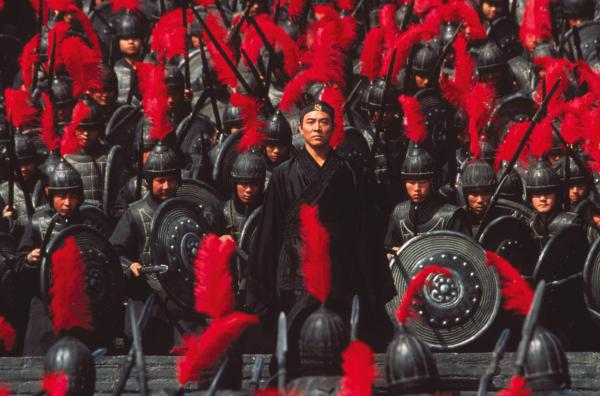
"Hero" stills
Although this film was considered by some people at the time as Zhang Yimou's imitation of Ang Lee ("Crouching Tiger, Hidden Dragon"), following the trend of "shooting martial arts for Westerners to watch", the audience aroused by "Hero" There is no doubt about the influence of the movie boom and its aftermath on an era. The "father of the mountain" of this Chinese blockbuster started 20 years of Chinese blockbusters. Among them are the painstaking efforts and glory of countless Chinese filmmakers, and there are also many "twists and turns" that make people laugh and laugh when they look back now.
Looking at the stages, the "martial arts blockbuster" craze created by "Hero" almost swept through the first decade of the 21st century. In an era when the "threshold" of movies is still high, and a large number of resources are concentrated in the hands of a few producers and creators who have the right to speak, big directors have begun to test the waters of ancient costume blockbusters. Chen Kaige, who is good at humanities, made "The Promise", and Feng Xiaogang, who is good at comedy, made "The Banquet"; Hong Kong directors who originally had a lot of martial arts skills also took advantage of the capital and market in the mainland to further expand the scale and industrial level of the film.
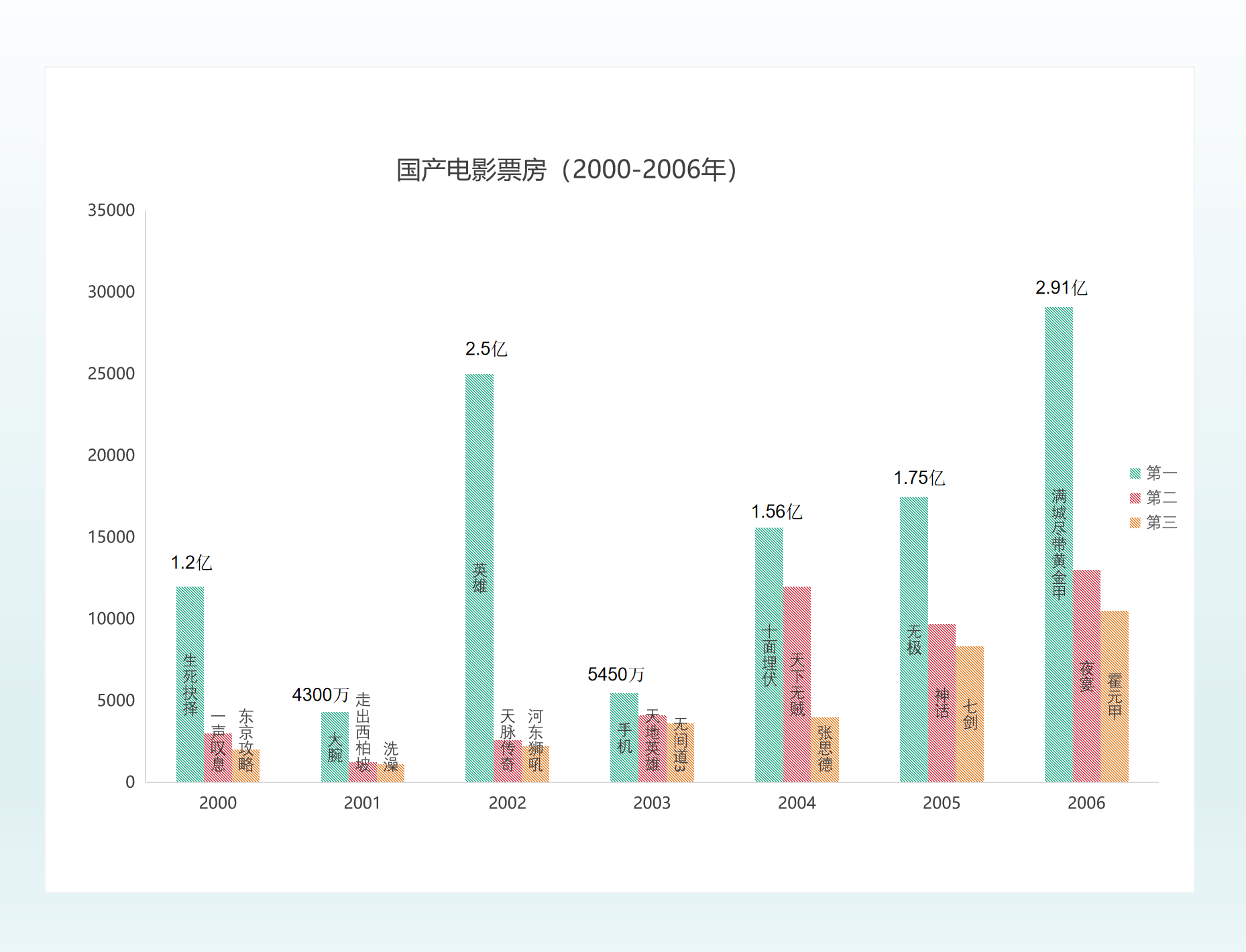
Top three box office domestic films from 2000 to 2006
Great directors have entered the bureau one after another, and the flames of war are everywhere
In 2002, when "Hero" was born, the annual box office was less than 1 billion yuan. The domestic box office of the overseas blockbusters "Lord of the Rings" and "Spiderman" were 56 million and 43 million yuan respectively. The box office of the second and third domestic films "Legend of Tianmai" and "Hedong Lion's Roar" are both in the 20 million level.
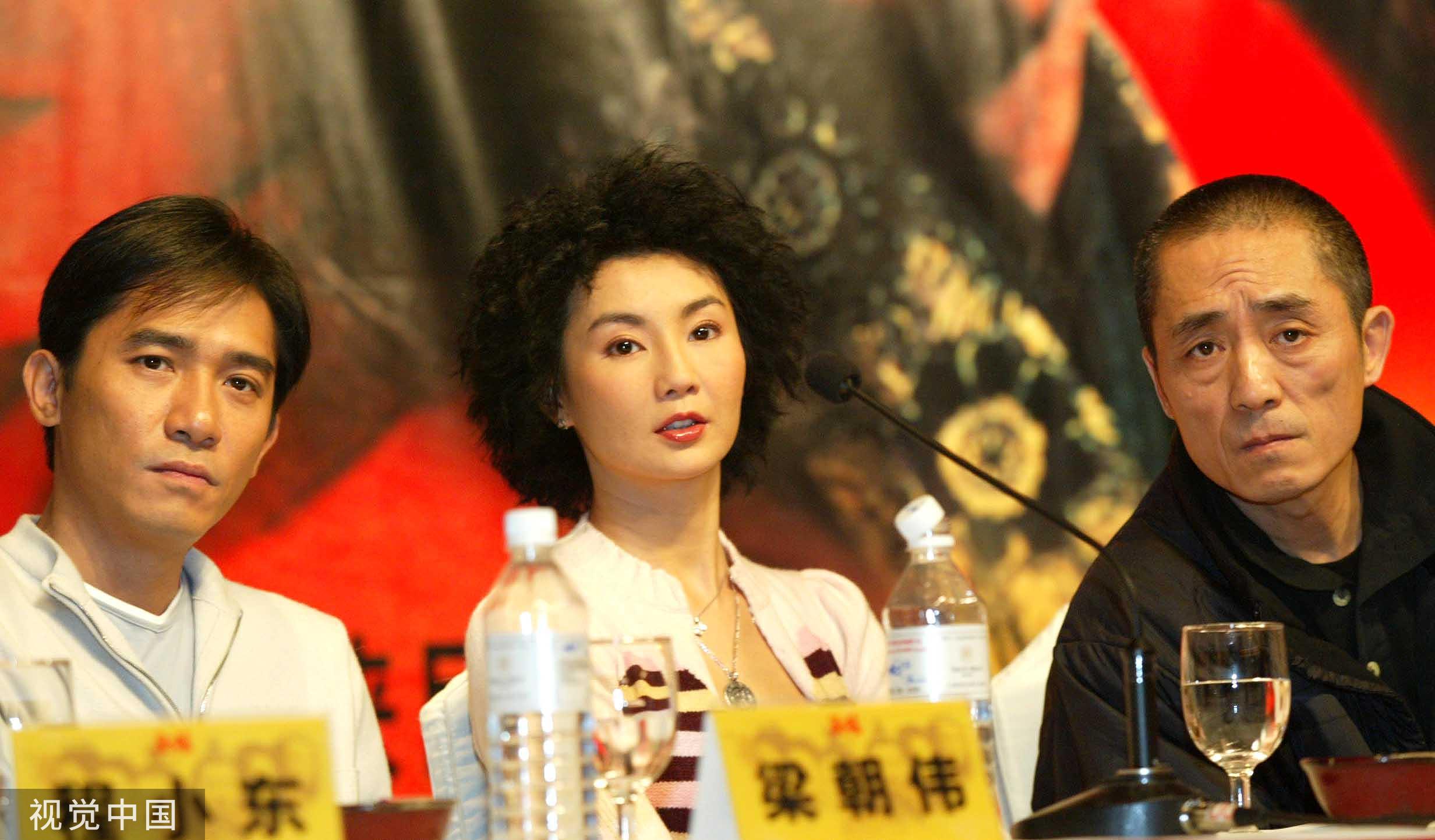
On December 16, 2002, Tony Leung, Maggie Cheung and Zhang Yimou attended the movie "Hero" Shanghai conference. Visual China Map
"Hero" single-handedly won more than a quarter of the box office of the year. The audio-visual spectacle it created, the combination of Chinese stars, and the construction of a production team of cross-border artists at home and abroad all provided the basis for later Chinese commercial blockbusters. widely referenced model.
At the same time, "Hero" is also a Chinese blockbuster that truly "goes out". , The color is outstanding, and for a long time, it is often used as a "test film" for home theaters.
In the words of producer Zhang Weiping, "Before the appearance of "Hero", our artists, including film investors, did not see the huge potential of the Chinese film market, nor did they see that a domestic film released would be popular among Chinese people. It caused such a big response in my mind, but I didn’t realize that the film needs to be operated and marketed.”
Therefore, the significance of "Hero" to Chinese films is "enlightenment". It truly makes the operation of films a market-oriented, international and professional film industry or cultural industry, and the concept of the film industry has gradually taken root in people's hearts.
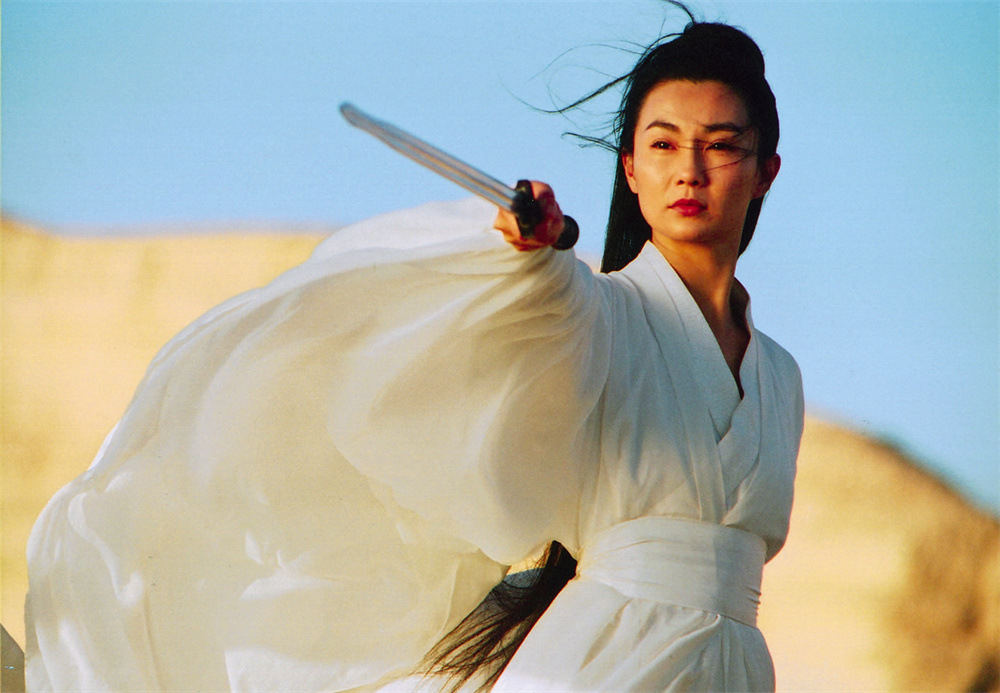
"Hero" stills
Two years later, Zhang Yimou presented another blockbuster "House of Flying Daggers", further implementing and extending his martial arts aesthetics. Zhang Ziyi, who played the supporting role in "Hero", became the focus of the film. She contributed her magnificent "dance skills" with her childhood dance skills from elementary school. A love triangle between a policeman and a courtesan.
"House of Flying Daggers" also allowed Zhang Yimou, who is good at visuals, to do a lot of writing. Zhang Yimou proposed that the conception of the action in the film should always be in the dynamics of running or riding a horse, "like an ancient road movie". The degree of "labor" in several battles is no less than that of the previous work. According to reports at the time, the Peony Square alone cost 2 million yuan to build the grand scenery of Dunhuang. It took more than two months to build more than 200 pillars, four to five hundred windows hand-carved from real wood, and more than 50 palace lanterns.
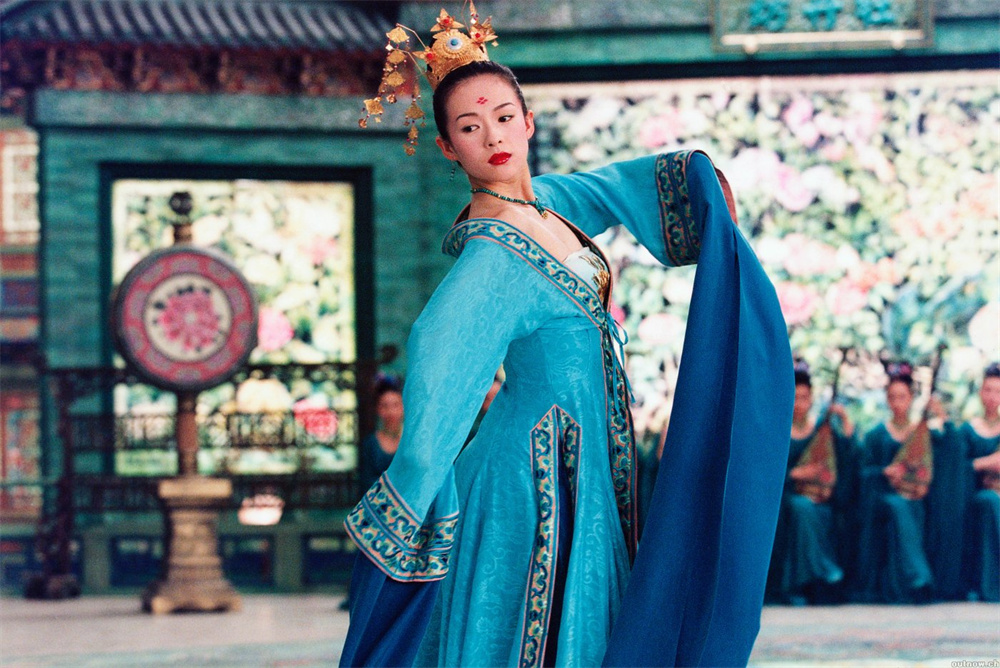
Stills of House of Flying Daggers
In order to pursue the ultimate picture, the crew spent two thousand dollars to buy local flower seeds in Ukraine, a country famous for its rich sunflowers, and hired more than 80 local flower farmers to sow golden sunflowers. However, due to the impact of the SARS epidemic that year, when the whole group of visas arrived in Ukraine, only a few flowers were produced, and the flower field became a grass field. The snow season in Ukraine came earlier, Zhang Yimou temporarily changed the ending, and there was the later "In the Snow" The poignant and sad parting.
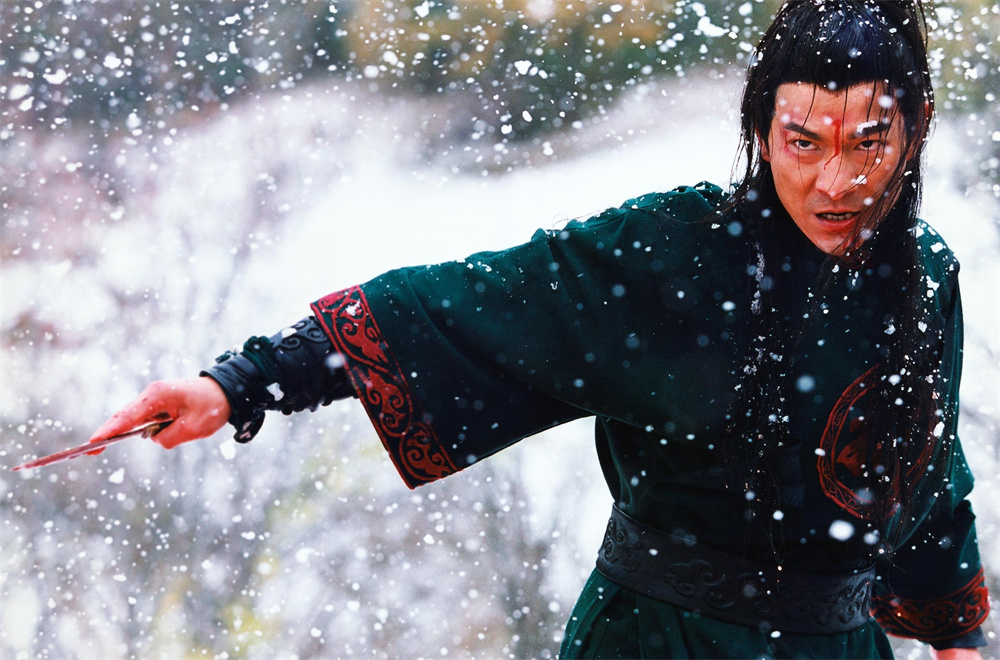
Stills of House of Flying Daggers
This year, Stephen Chow's "Kung Fu", Zhang Yimou's "House of Flying Daggers", and Feng Xiaogang's "A World Without Thieves", all three films broke 100 million. Leave behind. Since then, the box office of Chinese movies has officially entered the era of hundreds of millions, and every year, movies break through the 100 million mark.
In 2005, another great director "transformed", but it seemed that he was not as successful as Zhang Yimou. If it is said that Zhang Yimou's martial arts films received more controversy from criticism from intellectual elites, then "The Promise" directed by Chen Kaige, which contains oriental philosophy and cultural metaphor ambitions, was really sprayed down from the altar by the public with saliva . The complaint about "a murder caused by a steamed bun" has been circulated to this day, and the negative reviews back then seem to have become a "heart problem" for Chen Kaige for many years.
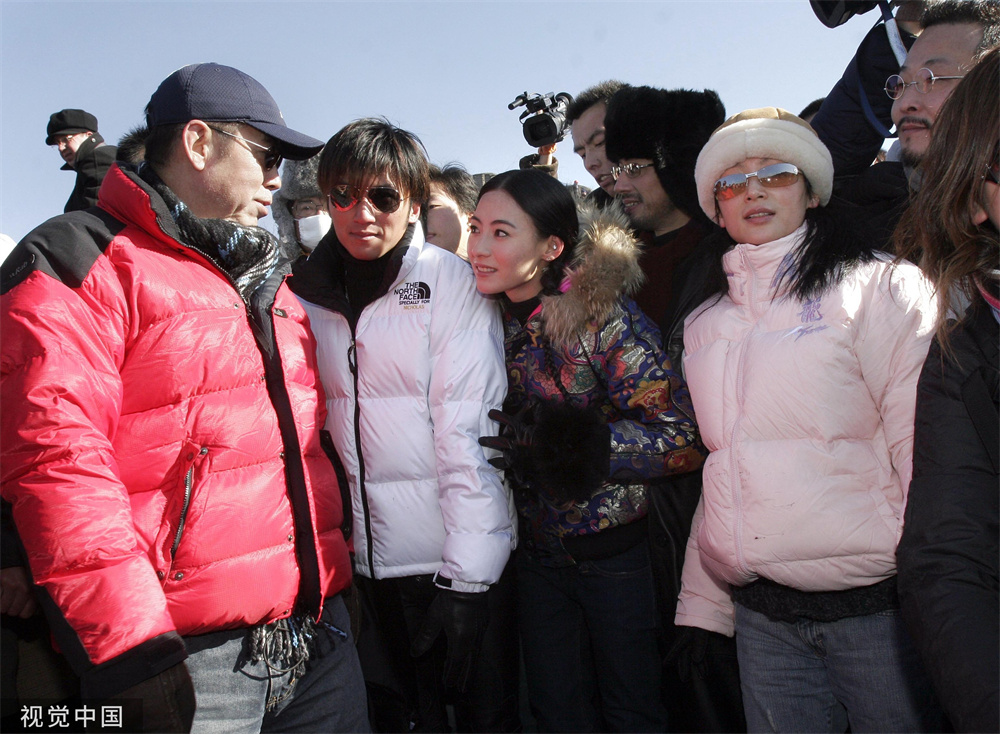
On December 11, 2005, in Beijing, Chen Kaige, Nicholas Tse, Cecilia Cheung, Chen Hong and other main creators of "The Promise" came to the Badaling Great Wall to promote the film. Visual China Map
In terms of the dimension of "blockbuster", Chen Kaige is not inferior to Zhang Yimou. The cost of the film is said to be as high as 300 million, and it brings together the most important star lineup in Asia. According to statistics from relevant departments, the filming of the whole film took 1090 days, with a journey of more than 10,000 kilometers, and mobilized more than 2,000 people in one day. At that time, the epic masterpiece with the largest investment in the history of Chinese film. Before revealing his true face, Chen Kaige was speculated to be creating China's "Lord of the Rings". Although the film topped the box office of the year with 181 million, compared with the investment, it was a disastrous failure.
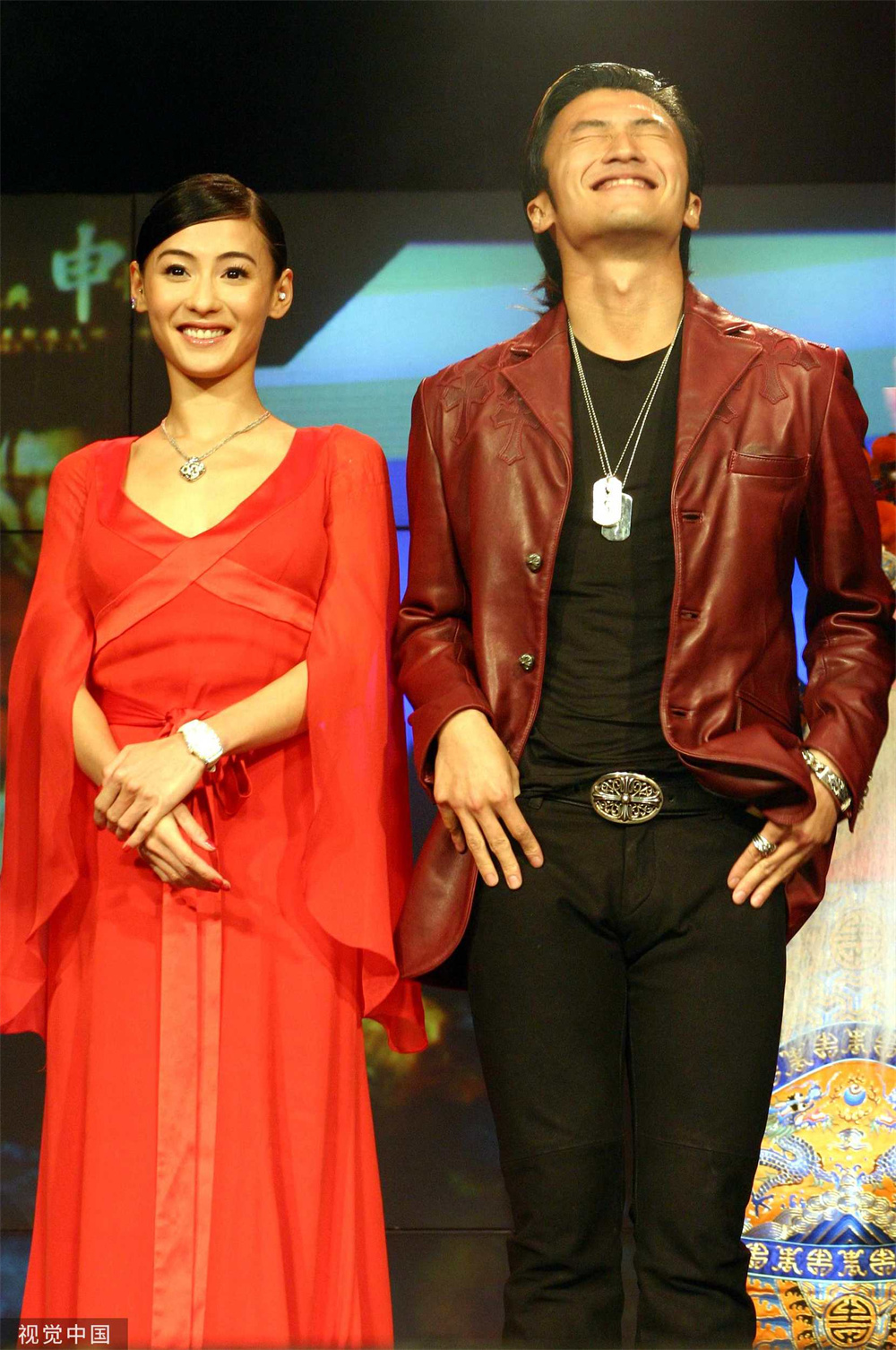
On December 16, 2005, Shanghai, the premiere of the movie "The Promise", with Cecilia Cheung and Nicholas Tse in the same frame. Visual China Map
In the same year, Jackie Chan and his good partner Tang Jili from "Police Story" also tried ancient costumes for the first time, and created "Mythology", which was also a great success that year. As a co-production film between the mainland and Hong Kong, the film also invited Kim Hee-sun, who was recognized as the "No. 1 Beauty in Korea" back then, to join in. The popularity of the Chinese-Korean bilingual theme song is longer than that of the film. The face of immortality, the infatuation that has been waiting for thousands of years, and the love that is predestined, the poignant beauty and lingering in it are more straightforward than "The Promise".
"Seven Swords", the third box office domestic film this year, also belongs to the theme of martial arts. Tsui Hark has not directed a feature film for three years after his two ambitious works, "Legend of Shushan" and "Black Man 2", failed one after another. At that time, Tsui Hark, who was questioned by the media as "exhausted of his talent", returned to martial arts with a super high investment of 140 million Hong Kong dollars, and returned to the rivers and lakes stories he is best at. He wanted to make a magnificent, magnificent and magnificent martial arts epic. The ratio of the film is also luxurious. The art director is Huang Jianeng from "Crouching Tiger, Hidden Dragon", the soundtrack is Japanese music master Kenji Kawai, and the visual effects are from the production team of "Lord of the Rings". , Zhang Jingchu, Lu Yi, Jin Suyan and other powerful star lineups joined in the performance.
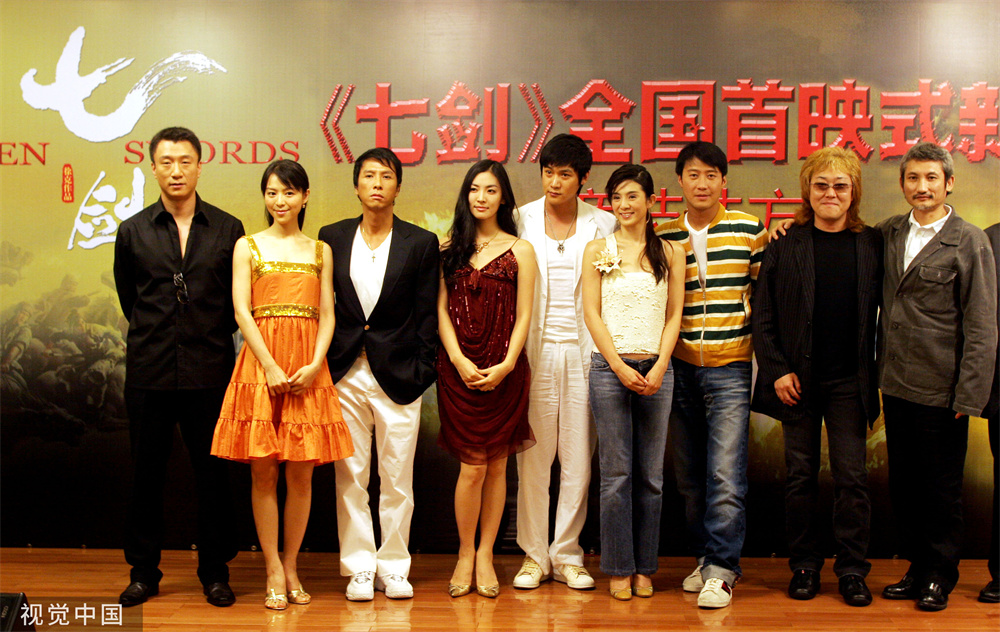
On July 20, 2005, in Beijing, the crew of "Seven Swords" attended the press conference for the premiere of the film. Visual China Map
In the plan of Ma Zhongjun, the mainland investor and producer of the film, "Seven Swords" is a grand idea: the film plans to shoot six films, each with an investment of 12 million U.S. dollars; the TV series plans to shoot 68 episodes, each with an investment of 1 million yuan. In addition, "Seven Swords" also includes an investment of 70 to 80 million in the development of online games and animation, plus discs and peripherals, with the aim of turning it into a series of full-copyright multi-system big IPs. Although in the end, this huge idea failed to be realized in the arena of "Seven Swords", and even because of the Waterloo of this movie, Tsui Hark stopped touching martial arts themes for the next 5 years. But until the "Di Renjie" series was launched in 2010, it obviously continued and practiced the previous ambition.
By the next year, another great director, Feng Xiaogang, also stepped out of his comfort zone and began to test the waters of costume martial arts movies. Although his "Mobile Phone" and "A World Without Thieves" still achieved impressive box office results in the past few years, when "The Banquet" invested by Huayi 20 million US dollars was brought to Feng Xiaogang, he decided to "expand himself way of play".
Also as a film co-produced by the mainland and Hong Kong, "The Banquet" is jointly produced by Huayi Brothers and Media Asia. A similar co-production model became mainstream in blockbuster films in those years, and it also laid the foundation for a large number of Hong Kong filmmakers to "go north". Tim Yeh specially created a magnificent palace for "Night Banquet", covering an area of 12,000 square meters, which became the largest palace interior scene in the Chinese film and television scene at that time. The creative concept was to imitate the palace into a ghost full of desire. At the same time, the production team took places such as Aershan and Moerdaoga Town to shoot the location, which also cost a lot of money.
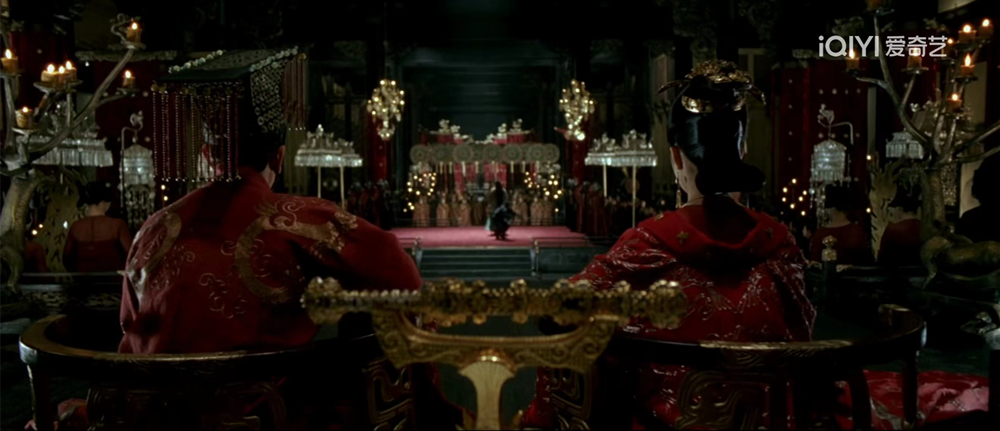
Screenshot of the interior scene of "Night Banquet"
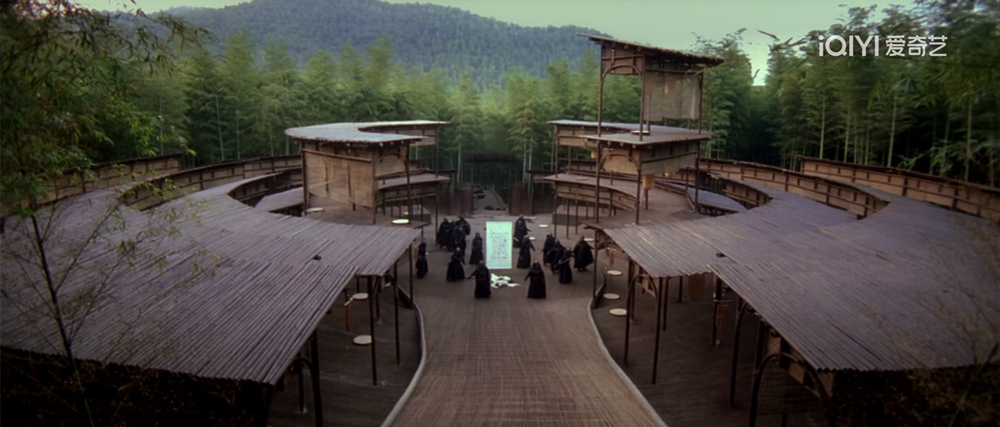
"Night Banquet" exterior screenshot
Tan Dun's music and Ye Jintian's art are in the same line for the ghostly spirit of lust. Jane Zhang collaborated with an international music master, and after singing the theme song for a blockbuster movie, she has improved a lot in terms of texture and rank compared to the same Supergirl.
The story of "The Banquet" is Cao Yu's "Thunderstorm" and William Shakespeare's "Hamlet". The story of the prince's revenge and incestuous love is told by Feng Xiaogang in a classical and "pioneering" way. As a result, that year, this story collided with Zhang Yimou's third costume blockbuster, "The Golden Armor in the City".
The story of "the broken chrysanthemum and the wounds all over the ground" contributed to Zhang Yimou's re-cooperation with Gong Li after 10 years of parting ways, and also pushed Zhang Yimou's "blockbuster aesthetics" to its peak. The joining of Jay Chou has brought the most entertainment topics to the movie. Now when I look back at the movie, a lot of press releases revolve around Jay Chou's every move, and the publicity effect is full. It can probably be regarded as a very trendy event more than ten years ago. An attempt at the "IP+Top Stream" mode.
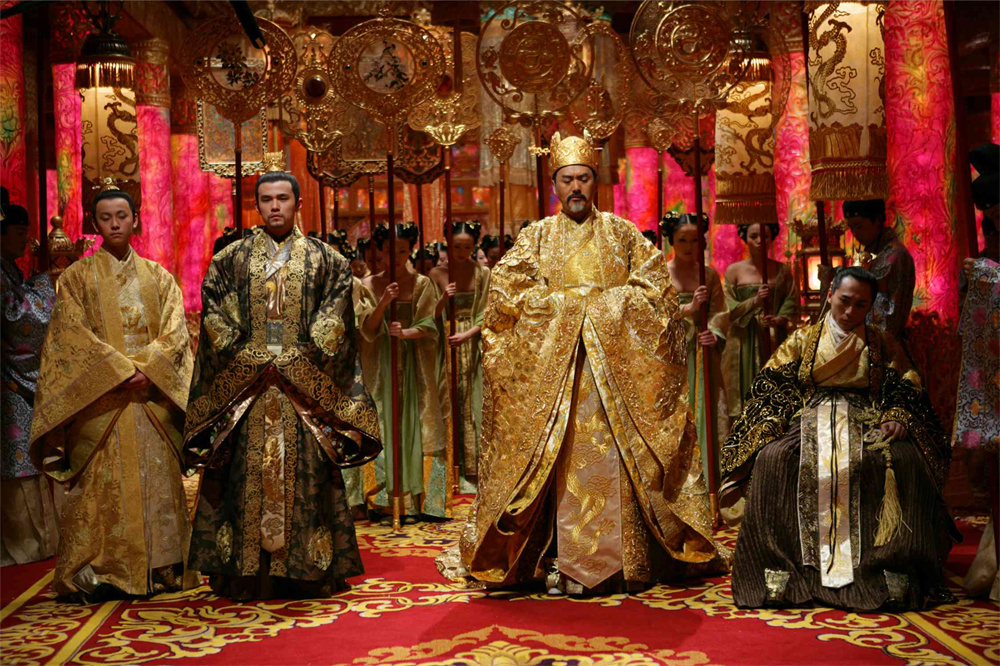
Stills of "The Golden Armor in the City"
In "Full City with Golden Armor", the core scene of the palace was shot in Hengdian. During the filming, nearly 3,000 workers were working overtime to set the scene. In order to meet the shooting needs of the film's Tang Dynasty background, Zhang Yimou asked to build a 5-meter-high wall. In the square with an area of more than 10,000 square meters, all of them are covered with yellow flowers, the number of which is as high as 4 million. For the most scene, 20,000 ensemble performers, including a large number of army officers and soldiers, are expected to be dispatched.
In the film, Chow Yun-fat's dragon robe was made by more than 80 workers in over a month. The entire costume was nailed with 18K gold flakes, weighed about 40 kilograms, and cost over one million; while the gold armor was made by Made of gold-plated metal, the helmet alone weighs about 45 kilograms. Chow Yun-fat started working out early in order to control the costumes for acting. The crew also specially ordered a safe with the same height as a person to store costumes.
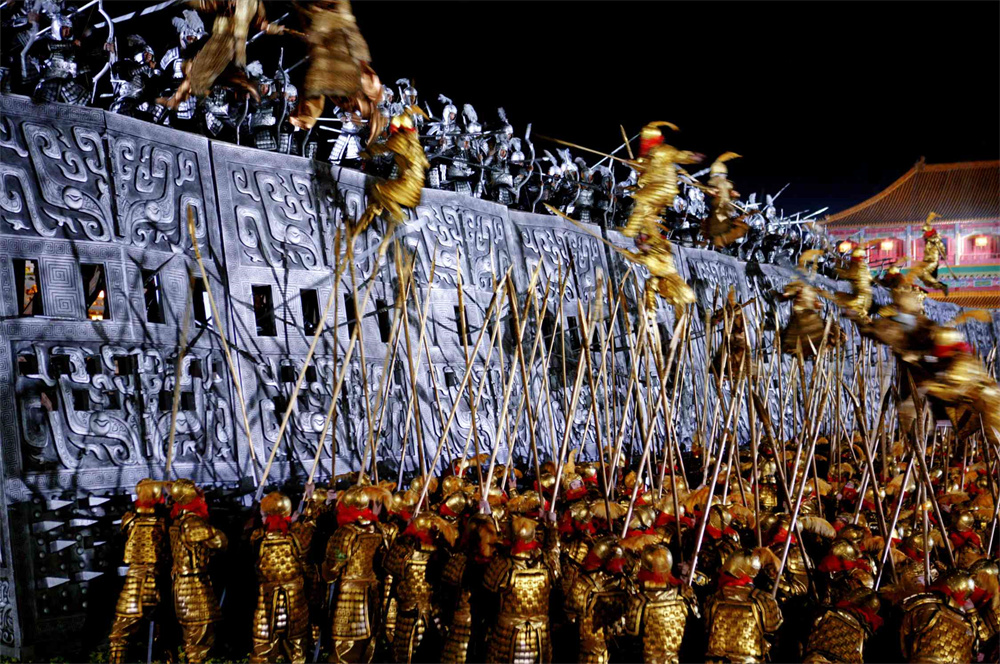
Stills of "The Golden Armor in the City"
With a huge investment of 360 million yuan, "Golden Armor" has truly achieved "global synchronization" release for the first time, and "Time Magazine" took the lead in selecting it as one of the "Top Ten Movies of 2006". On this list, the annual masterpieces of the godfathers of American films such as Clint Eastwood, Martin Scorsese, and Robert De Niro are concentrated, and "City Full of Golden Armor" is the The only Asian film in it.
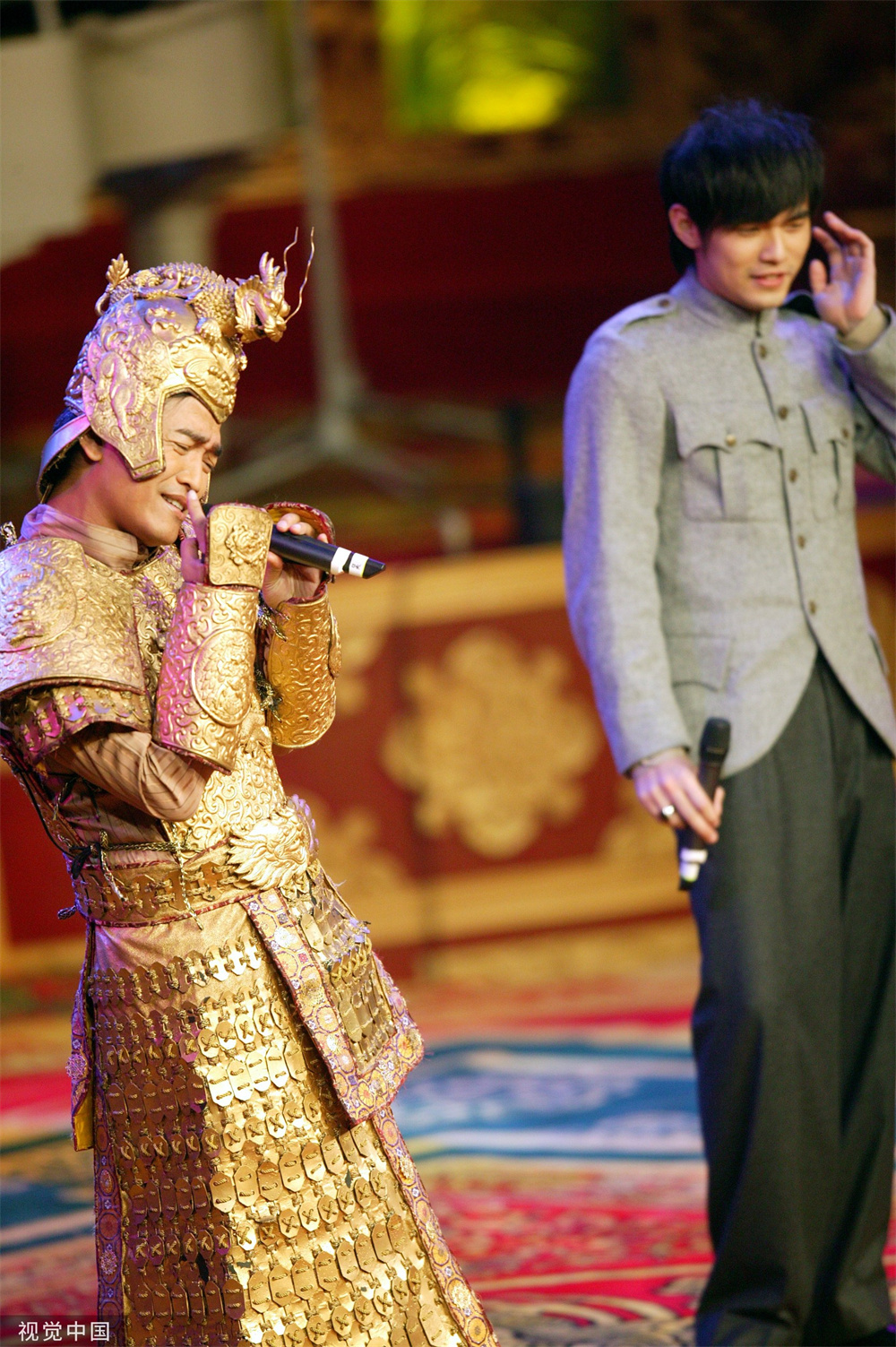
On December 14, 2006, the premiere ceremony of "The Golden Flower" was held at Beijing Film Studio. Wu Zongxian and Jay Chou are on the same stage. Visual China Map
In comparison, the 130 million box office of Feng Xiaogang's "Night Banquet" is not as expected. It must be known that "A World Without Thieves" had achieved similar box office two years ago, but the cost of the film was much lower.
In addition to another movie "Fearless", which also has the theme song sung by Jay Chou, in 2006 a total of 3 movies had a box office of over 100 million.
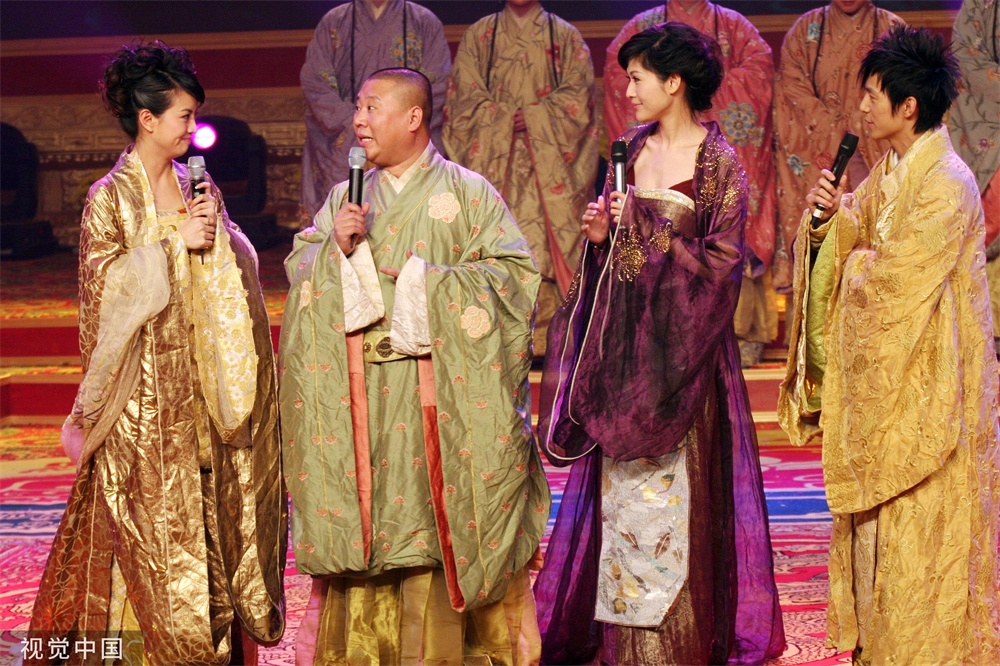
On December 14, 2006, the premiere ceremony of "The Golden Flower" was held at Beijing Film Studio. Tu Jingwei, Guo Degang, Shen Xing, and He Jiong hosted in costumes. Visual China Map
Constantly refresh the ceiling and expand the "100 million club"
For a long time, Chinese blockbuster = costume blockbuster has been the common memory of movie audiences in an era, and martial arts films have indeed contributed a lot to the development of China's film industry and industry. According to statistics, in 2002, the box office of "Hero" accounted for 27.8% of the total box office of the year; in 2004, "Kung Fu" and "House of Flying Daggers" two martial arts films accounted for 22.2% of the total box office of the year; "Accounted for 19.5% of the total box office that year; in 2006, "Fearless", "Golden Flowers in the City" and "Night Banquet" accounted for 20.6% of the total box office that year. And if only these martial arts giants accounted for the share of the box office of domestic movies that year, the above figure would nearly double.
There is no doubt that blockbusters have boosted the Chinese film market. From 2002 to 2007, in just five years, the total domestic box office revenue has increased from 900 million yuan, 1 billion yuan, 1.5 billion yuan, 2 billion yuan, 2.62 billion yuan to 3.327 billion yuan Yuan, increasing at an accelerated rate, with an increase of 360% in 6 years.
In 2007, "Voting Certificate" and "Assembly" both broke 200 million box office at the end of the year, and the total box office of domestic films beat overseas blockbusters for the fifth consecutive year. The era of the long-term bull market in movies has arrived."
At the same time, since "Heroes", the giant Chinese martial arts genre has combined "subgenres" such as martial arts fantasy, martial arts war, martial arts comedy, martial arts action, and martial arts science fiction in five or six years. Zhang Zhiliang's "Ink Attack" and Chen Kexin's "Certificate of Voting Names" can be regarded as a typical representative. Later, John Woo's "Red Cliff" and Li Rengang's "Three Kingdoms: Seeing the Dragon Unloading the Armor" also continued to expand along this sub-genre.
On the one hand, big directors, big stars, and top talents in other art fields are all eager to try in the field of classical aesthetics; For the producers, an important homework is that at the beginning of the filming, it is necessary to preset the income of overseas markets, especially the North American market. At the beginning of this century, "Crouching Tiger, Hidden Dragon" created the imagination of swords, lights, swords and shadows in the distant rivers and lakes of the Eastern world, which is also in the appetite of overseas filmmakers. The dimension of overseas sales of costume blockbusters also means another part of the considerable return rate. For example, in Cannes, overseas copyright sales of "The Banquet" were booming. Before the official release, Feng Xiaogang announced that the overseas sales of the film have fully recovered the cost, "after that, every penny of the domestic box office is already a profit."
When John Woo finished filming "Mission: Impossible 2" in 2000, a reporter asked him if he was interested in making some more Chinese films. Wu Yusen said, "No more, I will continue to make English-language films." Eight years later, this film master who made his way to Hollywood once again refreshed the ceiling of investment in "blockbuster" Chinese-language films with "Red Cliff" with an investment of more than 80 million US dollars. This familiar story of the Three Kingdoms is presented in two parts. Tony Leung, Takeshi Kaneshiro, Zhang Fengyi, Zhang Zhen, Hu Jun, Nakamura Shido, Lin Chiling and other leading actors form a dazzling lineup of stars.
Gan Lu, the documentary director who filmed the entire process of "Red Cliff", said that people who have not been on the set of a blockbuster film do not know what is complicated. It was originally scheduled to be filmed in the Yangtze River in Hubei, but due to environmental protection issues, it had to be temporarily changed to the Hebei studio;
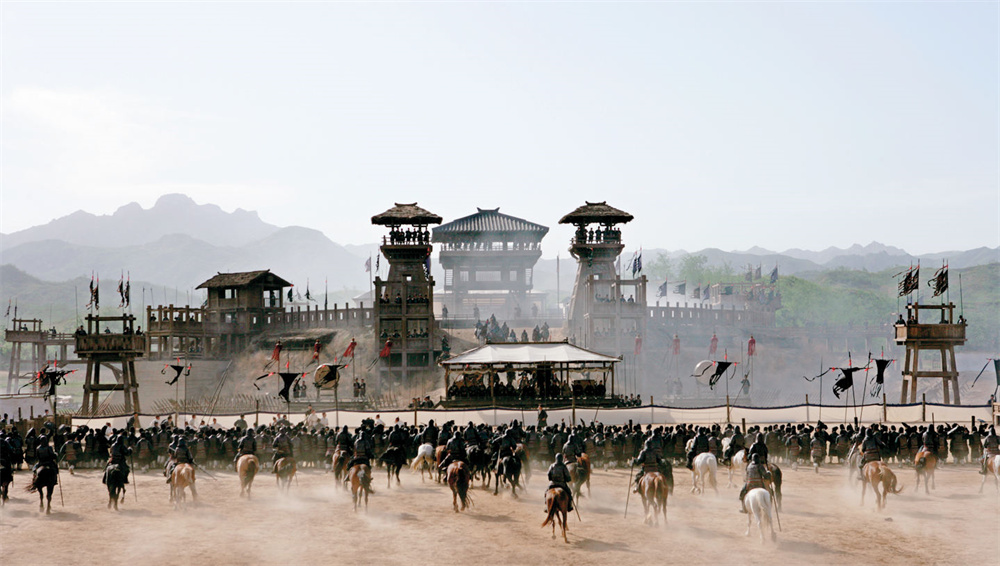
"Red Cliff" stills
"Red Cliff" can be called the pinnacle of ancient warfare. A lot of space is used in the film to describe the ancient formations, and the film takes advantage of its irreplaceable visual presentation, rather than just promoting stars to shape characters and tell stories that the audience is already familiar with. The methods of arranging troops such as conical formation, geese formation, and eight-diagram formation have been carefully studied. In the water battle of the heavy scene, about 2,000 warships of various ancient props were used to gather in a reservoir surrounded by mountains in Hebei. Wu Yusen used 3D computer technology to transform this reservoir into the Yangtze River and the surrounding mountains into Red Cliffs. Five well-known American computer special effects companies were responsible for the computer animation part of the film. According to statistics, the CG scale of the highlight of "Red Cliff" is comparable to that of "Lord of the Rings".
At that time, there were many precedents for joint ventures with Hong Kong or Hollywood. However, due to the high budget and high risk of this film, the film crew set their sights on the Asia-Pacific region. Of the RMB 600 million investment in "Red Cliff", RMB 150 million came from mainland China, and the rest mainly came from Japan, South Korea, Hong Kong and Taiwan. Wu Yusen’s American company obtained the film insurance from the film guarantee company, and Hong Kong’s Standard Chartered Bank provided part of the loan for the filming. It can be said that "Red Cliff" has raised the level of Hong Kong films and even the entire Chinese film in terms of financing and distribution systems. In the ten years since the film industry has mentioned the need for completion guarantees more frequently, there have been few financial cases as successful as "Red Cliff". According to "Titanium Media" report, due to the good pre-sale of copyright, the cost of "Red Cliff" has been covered before its release.
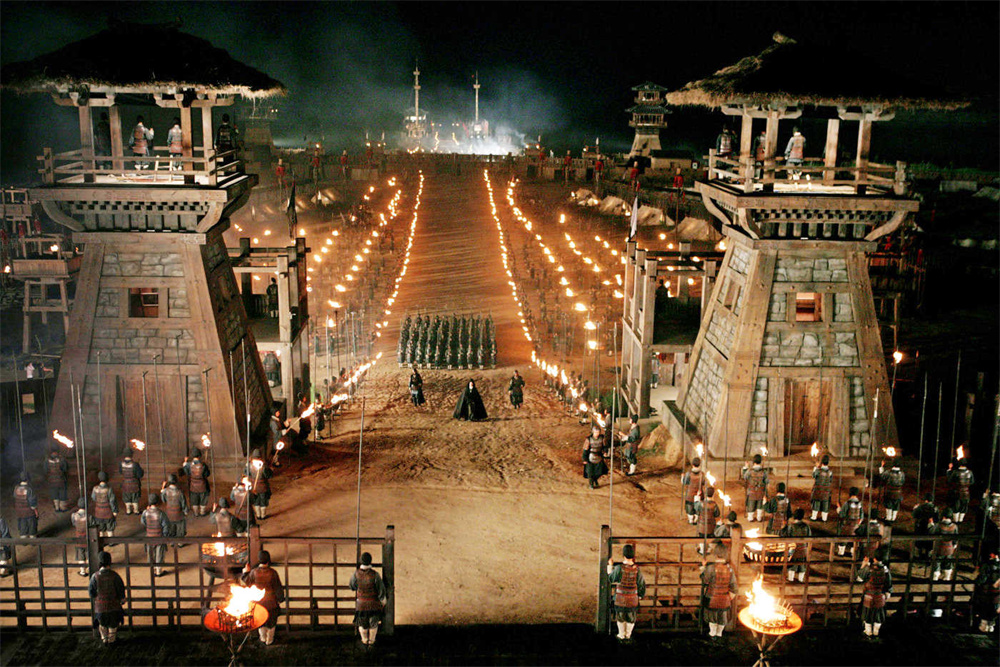
"Red Cliff" stills
Although the restoration of history caused a lot of controversy at the time, it is undeniable that "Red Cliff" has so far been unmatched in the direction of the big scenes of historical films.
In the same year, in another direction of costume blockbusters, "Painted Skin" opened up another direction of thinking for Chinese blockbusters-fantasy. Director Chen Jiashang turned this famous story of Liao Zhai into a love tragedy full of modern colors. Strange hunting special effects, magical style, tear-jerking love and novel imagination, these elements are integrated to present an oriental fantasy world with highly typed narrative and fresh film audio-visual means. Spending millions to shoot a peeling shot of only six seconds also brought a new experience to the spectacle presentation of Chinese blockbusters.
Another milestone of this movie is that it created a National Day schedule. "Painted Skin", which won a box office of 260 million in October, activated the vitality of cinemas during the National Day. In October of the following year, "Founding of the People's Republic of China", "Sound of the Wind", "Wheat Field" and "Wolf Disaster" came in droves. In the future, this schedule will become a record-breaking one after another, and various film studios have offered Wang Zhan products "a battleground for military strategists".
In those years, there was a word with a sense of age to measure the box office appeal of a director or actor, called "100 million yuan club". Breaking through 100 million was once a major hurdle for Chinese films to measure whether the box office was successful enough. From 2000 to 2003, only two films had a box office of more than 100 million yuan. By 2009, there were as many as 10 films that could enter the 100 million yuan club in a year. In addition to the original "three-legged" three major Chinese directors, and Hong Kong directors who have more advantages than mainland directors in genre expression, Lu Chuan ("Nanjing! Nanjing!"), Ning Hao ("Crazy Racing"), Jin Yimeng ("Perfect" thanks to the producer and starring Zhang Ziyi) has become a member of this top club. In addition, the animated movie "Pleasant Goat and Big Big Wolf" is also among them. Some scholars have described that the threshold for blockbuster Chinese films has entered the period of "Warring States Heroes" from the "Romance of the Three Kingdoms" era.
Prosperity and decline, new types are brewing and rising
A kind of transformation occurred after 2007. With the rapid growth of the local market space, the Chinese-style blockbusters in the development stage were gradually stripped away from the swords and swords of the rivers and lakes. The new mainstream films represented by "Assembly" and "The Founding of the People's Republic of China" began the contemporary construction of Chinese mainstream culture and mainstream value forms; films represented by "Ip Man" and "October Besieged City" started the return of the traditional heroic spirit; Various films such as "Yangtze River No. 7", "Painted Skin" and "Let the Bullets Fly" have fully expanded and integrated in the genres of family carnival, fantasy, and comedy. Although costume action blockbusters still maintain a certain volume and continue to develop, their gradual decline has become an established fact.
In 2009, "The Founding of the People's Republic of China" created the mode of "counting stars" for the main theme movie. The box office refreshed the market's imagination for the main theme works.
Another spy war movie, "The Wind", deduces the complex human heart in the turbulent plot arrangement. Its success surpassed the box office performance of 235 million that year, and it is still recognized that this genre cannot be surpassed in the field of Chinese films. ceiling.
Zhang Yimou adapted from the Coen Brothers' "Blood Labyrinth" "Three Shots Surprise", although it can still maintain a high box office of 200 million +, but compared with Zhang Yimou himself, it is Waterloo, not to mention the evil that this movie encountered. It can be said that it condenses the audience's aversion to the "fake big empty" of the costume blockbusters in those years.
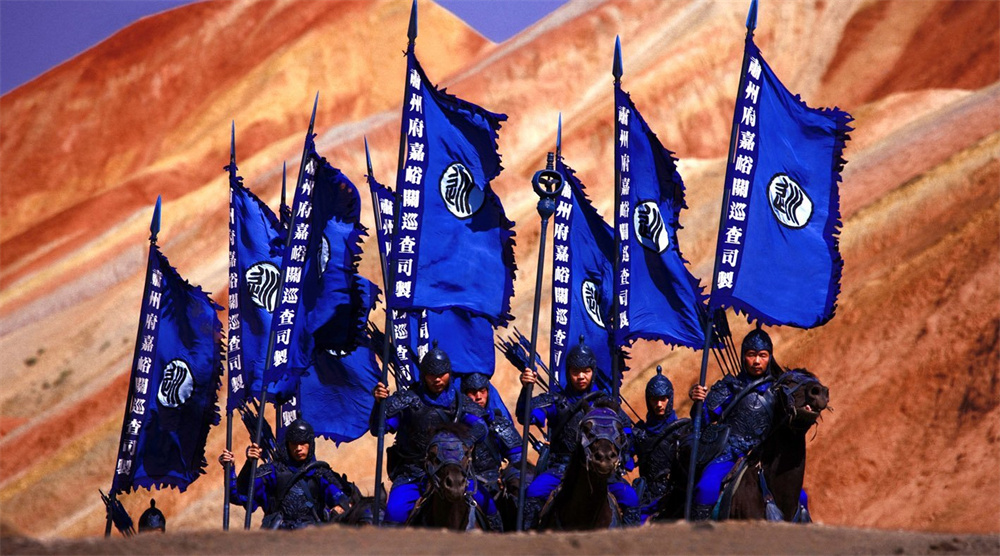
Stills of "Three Shots Surprise"
In 2010, "Avatar" raked in 1.3 billion yuan at the box office in China, and new projection technologies such as 3D and IMAX became the new lifeblood of movies. The box office champion of the mainland movie that year was "Tangshan Earthquake" with 649 million yuan, breaking the record of a domestic movie.
The box office revenue of "Tangshan Earthquake" exceeded the sum of the two "Red Cliff". This "proposition composition" by the Tangshan government to commemorate the city's "rebirth" and use it to market the city was completely new by Feng Xiaogang. Different from all previous blockbusters, "Tangshan Earthquake" pioneered the exploration of disaster-type visual effects. The violent earthquake scene in the film is only about 7 minutes long, but the tragic scene of everything collapsing when the earthquake strikes is vividly presented on the big screen. At that time, the devastated scene still really shocked the audience. And the production cost of this short special effect is as high as nearly 80 million yuan.
At the same time, the Chinese film market has entered the era of tens of billions with great triumph. Director Lu Chuan later mentioned in a lecture reviewing the film industry that Han Sanping, then chairman of China Film Group, said excitedly, "I believe that I can see 30 billion Chinese films when I am alive." Gritting his teeth and shaking his hands, it seemed like he was saying a huge prophecy."
It is worth noting that this year's New Year's Eve has gathered three top directors Jiang Wen, Feng Xiaogang, and Chen Kaige unprecedentedly. If Zhang Yimou hadn't moved up the schedule of "Love in the Hawthorn Tree", the audience would have seen four big-name directors on the same stage. . "How many movies can be accommodated in one schedule at the same time" and "whether the cakes in the market can satisfy everyone" have also been discussed unprecedentedly.
The emergence of "Let the Bullets Fly" announced the birth of a Chinese-style comedy blockbuster, and the annual slogan of "Standing and making money" also triggered in-depth thinking on the multi-adjustment of blockbuster films between market demand and artistic conception. In such a commercial blockbuster dedicated by the artistic elite, the audience found a pleasure in recreating the mainstream culture and the old order.
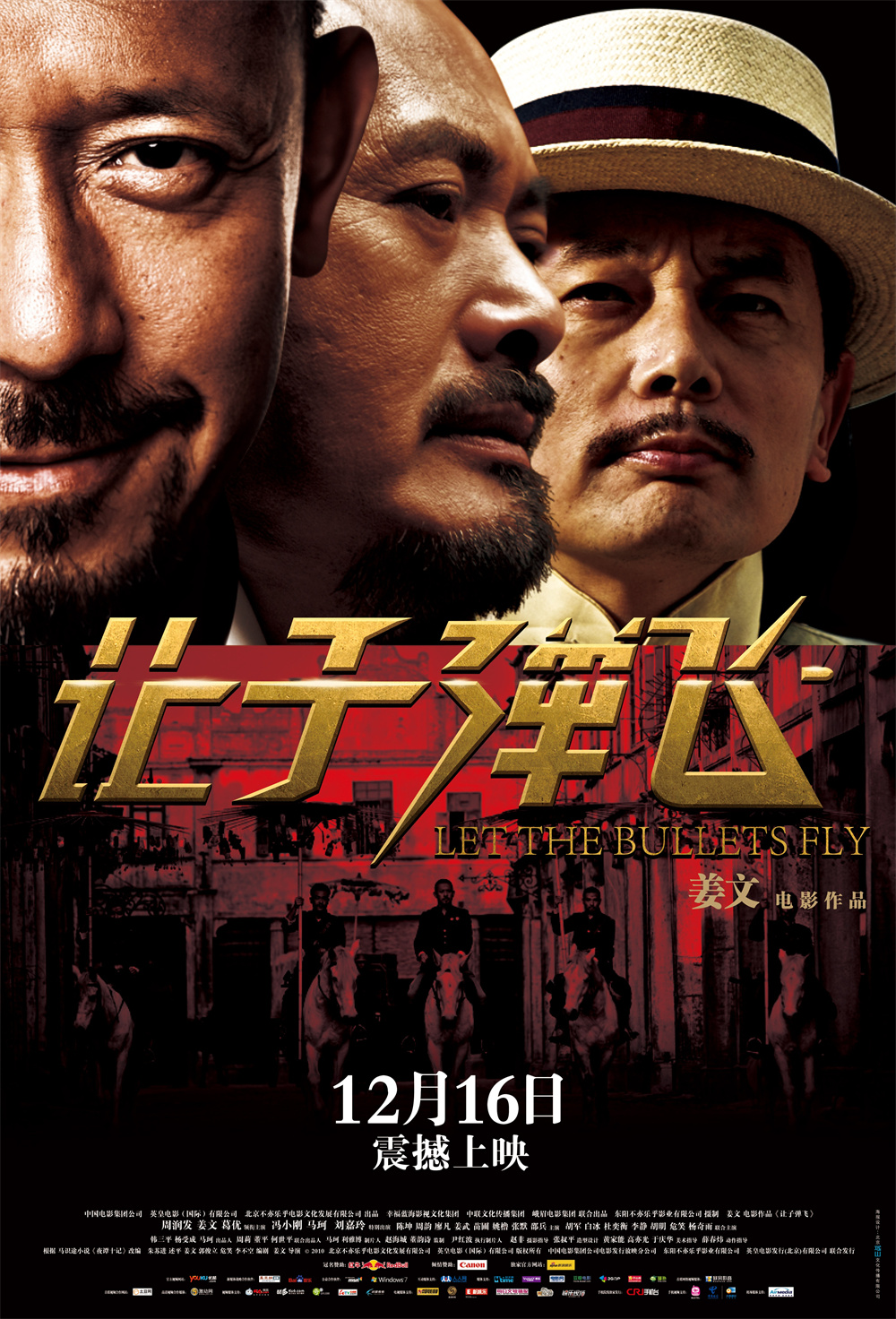
"Let the Bullets Fly" Poster
Chen Kaige once again built a film city in Xiangshan, Zhejiang. It cost 40 million yuan to build the "Orphan City" covering an area of 152 mu. In the city, there are Taoyuan Palace, blacksmith shop, school, Gongsun Mansion, market, military camp, Tu'anjia Mansion and other scene buildings. Compared with the box office of "The Orphan of Zhao" which exceeded 100 million yuan, compared with the box office of "Tangshan Earthquake" 649 million yuan, "Let the Bullets Fly" 636 million yuan, and "If You Are the One 2" 471 million yuan in the same year, it already reflects the audience's preference for blockbusters in ancient costumes. "Aesthetic fatigue".
As for Tsui Hark's "Di Renjie: The Empire of Heaven", although it is also a blockbuster of ancient costumes, it mixes the genre of suspense and investigation, and opened an IP of "Di Renjie Universe". Series development, this is the advancement and madness of the next stage of Chinese film.
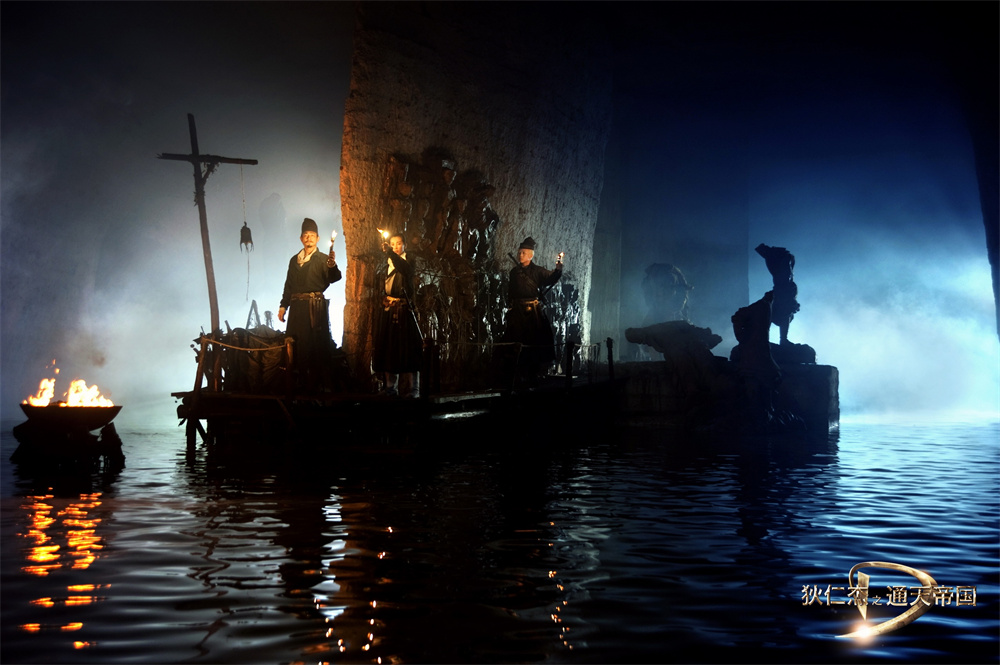
Stills of "Di Renjie: Tongtian Empire"
Looking at the first decade of the 21st century, after the "inevitable choice" of the reform of the theater chain system in China, the productivity has been continuously liberated, the market capacity has continued to expand, and the product development has effectively expanded. Indicators related to the film industry, such as the number and number of viewers, have all increased dramatically. Movie consumption has become an indispensable and important part of people's cultural consumption, and it has also become a cultural hot spot and even a social hot spot.
Under the fierce battle of the tens of billions of market, the historical mission of costume blockbusters has also been completed in stages.


